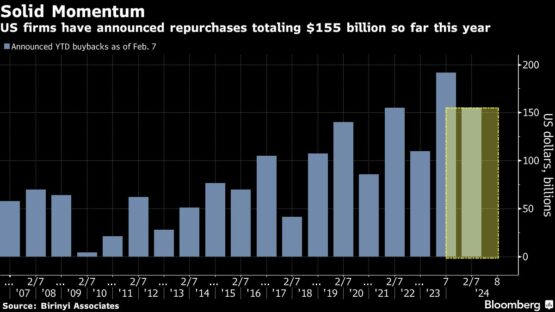Stronger than expected earnings are leading companies on both sides of the Atlantic to announce share buybacks at a blistering pace as 2024 gets going — a potentially crucial pillar of support for global stock markets already trading at all-time highs.
Facing the highest borrowing costs in decades, corporations turned stingy on share repurchases in 2023, but that’s changing with buybacks projected to increase this year. Profit growth is improving and investors expect the Federal Reserve and European Central Bank to start cutting interest rates this year. The reduced borrowing costs should give companies more cash and room to take on debt to boost their share prices.
ADVERTISEMENT
CONTINUE READING BELOW
US companies have announced $105 billion in planned share repurchases in the first seven days of February, surpassing the full-month tally in January. It’s the strongest start to a February ever for announced buybacks and the second-best start to a year after 2023, data by research firm Birinyi Associates Inc. show. Perhaps not surprisingly, the S&P 500 Index is has posted nine records so far this year.
“It does tell you that management is getting more confident about where the economy is headed,” said Matt Maley, chief market strategist at Miller Tabak + Co. “It should be seen as somewhat constructive indicator. Stocks are not as cheap as last year, but companies announcing buybacks think the rally has more room to run.”
S&P 500 firms are expected to repurchase $885 billion in stock this year, up 10% from 2023 but down 4% from the record-setting pace in 2022, according to preliminary data from S&P Dow Jones Indices.
Meta Platforms last week announced plans to buy back an additional $50 billion in stock, among the biggest authorizations in US history, Birinyi’s data show. That was followed by Carlyle Group Inc on Wednesday saying it plans to buy back as much as $1.4 billion in shares, and Alibaba Group Holding Ltd saying it’s boosting its repurchase program by $25 billion.
“While the market is at record highs, many companies’ stock prices have continued to languish and as a result buying back the stock is an indication from these companies that they see their stock as a good value,” said Jeff Rubin, Birinyi’s director of research.
While buybacks may help share performance, the impact can be somewhat diminished because high valuations mean companies are likely to scoop up fewer shares, said Howard Silverblatt, senior index analyst at S&P Dow Jones Indices. In addition, the expenditures aren’t necessarily that big when measured against the companies’ earnings and market values, he said.
Buyback announcements have increased in Europe as well, particularly in the financials and energy sectors, which that returned the most to shareholders last year. With banks continuing to reap the benefits of higher borrowing costs, share repurchase programs at Unicredit SpA, Intesa Sanpaolo SpA, Deutsche Bank AG and Banco Bilbao Vizcaya Argentaria SA are pushing stocks higher.
ADVERTISEMENT
CONTINUE READING BELOW
A Goldman Sachs Group Inc. basket of high buyback yield stocks has risen twice as much over the past 12 months as the Stoxx Europe 600 Index‘s 5.9% return, while the Solactive European Buyback Index also surged 10% during the period.

All of which is a good sign for the global economy and markets, as a strong pipeline of planned buybacks shows confidence among corporate executives, said Marshall Front, chief investment officer at Front Barnett Associates.
“The economy continues to improve, inflationary pressures continue to subside, interest rates will continue to decline — and all of the above is giving corporate executives the confidence they need to announce share buybacks,” Front said by phone, referring to the US. “It means that companies don’t expect a major economic downturn.”
© 2024 Bloomberg

